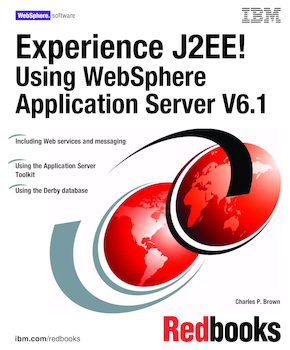Experience J2EE! Using WebSphere Application Server V6.1
An IBM Redbooks publication
Note: This is publication is now archived. For reference only.

Published on 31 January 2007
ISBN-10: 0738494518
ISBN-13: 9780738494517
IBM Form #: SG24-7297-00
Authors: P Charles Brown
This IBM Redbooks publication is a hands-on guide to developing a comprehensive J2EE application, including core functions, security, Web services, and messaging. In the context of J2EE, messaging is also known as Java™ Message Service (JMS).
Novice users are thus able to experience J2EE, and advance from theoretical knowledge gained by reading introductory material to practical knowledge gained by implementing a real-life application.
Experience is one stage in gaining and applying knowledge, but there are additional stages needed to complete the knowledge acquisition cycle.
This book also helps in those stages:
Before experiencing J2EE, you learn about the base specifications and intellectual knowledge of J2EE through brief descriptions of the theory and through links to other information sources.
After experiencing J2EE you will explore advanced J2EE through previews of advanced topics and links to other information sources.
Part 1. Preliminary activities
Chapter 1. Introduction
Chapter 2. Install and configure software
Chapter 3. Configure the development environment
Chapter 4. Prepare the legacy application
Part 2. Core J2EE application
Chapter 5. Create the employee data access element
Chapter 6. Create the funds data access element
Chapter 7. Create the donate business logic element
Chapter 8. Create the employee facade business logic element
Chapter 9. Create the Web front end
Chapter 10. Create the application client
Chapter 11. Implement core security
Chapter 12. Alternative Import the core J2EE application
Part 3. Web services
Chapter 13. Create the Web service
Chapter 14. Implement security for the Web service
Part 4. Messaging
Chapter 15. Create the message-driven bean
Chapter 16. Add publication of results
Chapter 17. Implement security for messaging
Chapter 18. What next?
Appendix A. Additional material